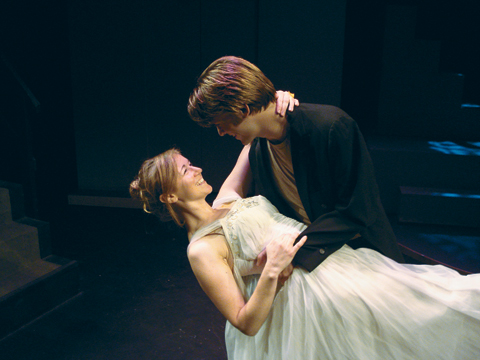
DEEPLY TOUCHING The female perspective on the tale of Orpheus and Eurydice.
|
The memory-darkening waters of the Lethe run in unlikely channels — inside a blue-lit elevator, through a system of pipes and spigots, in the sound of a persistent drip always somewhere just out of sight. So are the tributaries of loss, grief, and memory ever-present in the script and the staging of Eurydice, Sarah Ruhl's scintillating take on the classical Greek myth of Orpheus, the musician who journeys to the underworld in pursuit of his wife. This mesmerizing show, which shifts the focus from the grieving husband to Eurydice herself, taking playful liberties as it does, receives an exquisite production of the Theater Project. Featuring some of the area's most luminous actors, under the direction of Christopher Price, its magic absolutely should not be missed.
Our tale opens as the lovers bask on the beach, Eurydice in a polka-dot one-piece, and Orpheus in Hawaiian-print shorts; Casey Turner and Ian Carlsen inhabit them with almost preternatural light and ecstasy. Together, they are ravishing in the warmth of their affection, constantly touching each other's skin, smiling, washed in golden light (JP Gagnon's gorgeous design). The couple's happiness is strained only by the tension between her love of words against Orpheus's love of music, and by her sadness, on their wedding night, that her deceased father isn't there: "A wedding is for fathers and daughters," she sighs as she draws water from a pump, watching it pool over stones.
But she will see him that very night, after falling from the high-rise apartment of the Nasty Interesting Man (David Currier, looking alarming first in a black trenchcoat and later in all red and a Clockwork Orange T-shirt, riding a tricycle) who lures her away from the wedding party. And so the rainy elevator (part of Price's compelling set of high and low platforms, with fine use of the sounds and actual running of water) delivers her to the underworld, which is policed by the bored, snide Big, Loud, and Little Stones (the delectable Lisa Muller-Jones, Molly Bryant Roberts, and Tootie Van Reenen, styled à lajaponaise with white face paint and silver-dollar plants).
There, Eurydice does not yet recognize her father (Craig Ela, with lovely, earnest gentleness): He steps carefully and stiffly in a gray suit, and she at first takes him for the porter. But he attends affectingly to her confusions about death; their father-daughter bond, even before she understands it, unfolds with a slow radiance. "What is that language you're speaking? It's like a fruit," she puzzles sweetly, as he names his relation to her. When she asks for a hotel room, Ela meticulously, lovingly strings white twine from hooks into vertical and horizontal lines to form an almost-square — a room for her, in a place of no rooms. He smiles with quiet joy at his grown daughter's impulsive hopscotch play, and after a startled Eurydice has dropped a heavy book (lowered down to her by an increasingly desperate Orpheus), her father reads aloud to her, with wistful pleasure: "We two alone will sing like two birds in the cage."